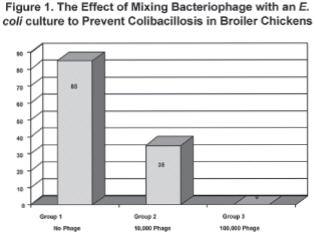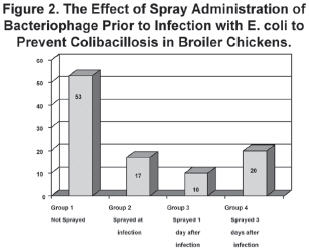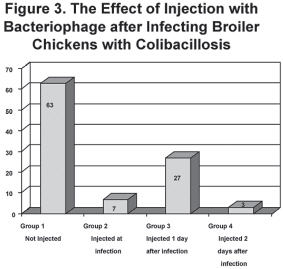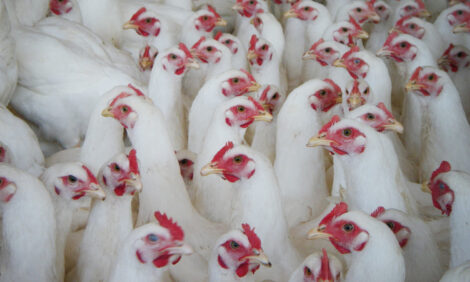



Bacteriophage: A Replacement for Antibiotics?
By William E. Huff, USDA/ARS Poultry Production and Product Safety Research Unit, Center of Excellence for Poultry Science at the University of Arkansas's Avian Advice - Antibiotics, miracle drugs of the 20th century, have saved millions of human and animal lives, and contributed to efficient animal production to feed a hungry world. Antibiotics are used in poultry production in high doses to treat poultry diseases and at low doses in feed to prevent poultry diseases, as well as reduce the levels of food borne pathogens on poultry products.However, over the last decade the emergence of bacteria resistance has made it increasingly difficult to treat human and animal diseases with antibiotics. Whether the use of antibiotics in animal production poses a threat to human health has been debated for decades and remains undecided. Yet concern over the failure of antibiotics to effectively treat human diseases has led the European Union to ban the use of low doses of antibiotics in animal feeds and encouraged government officials to seriously consider drastically restricting the use of antibiotics in animal production in the United States. Concerns over antibiotic resistance prompted many researchers around the world to look for alternatives to antibiotics. However, to date none of these alternatives consistently provide improved animal production comparable to the growth promoting effects of antibiotics.
Research into Antibiotic Alternatives
Over the past several years we have been looking at the potential of
bacteriophage as an alternative to antibiotics to prevent and treat poultry diseases, and
reduce food borne pathogens on poultry products.
Bacteriophages are viruses that infect and kill bacteria. Bacteriophages are
nature’s own way of controlling bacteria, and they are safe, because they have no
known effects on animal or plant cells. Therefore, it would appear possible to use
bacteriophage to prevent and treat bacterial diseases of animals and humans.
Colibacillosis (airsacculitis) is a serious infection of poultry caused by the
bacteria Escherichia coli. This disease starts as a respiratory infection in poultry,
then enters the blood stream and, when severe, kills chickens through infection of
the liver and heart. We were able to isolate a bacteriophage to an E. coli that causes
colibacillosis in chickens. Over the last several years we have tested the bacteriophage
we isolated to see it was possible to prevent or treat colibacillosis in poultry.
In trial 1 we determined whether or not the bacteriophage could inactivate E. coli and
protect birds from death by E. coli infection. We had three treatment groups and all were infected
with 10,000 E. coli cells, but the cultures used to infect the groups were treated in different ways.
The culture used to infect birds in treatment group 1 contained only E. coli, no bacteriophage.
The culture for group 2 had 10,000 bacteriophage particles added to the E. coli and group 3 had
100,000,000 bactriophage particles added to the E. coli culture. The results of the trial are shown in
Fig. 1. As expected, most birds in group 1 died. However, birds in groups 2 and 3 were partially or
completely protected by the bacteriophage (Huff et al, 2002a).
To further test how bacteriophage could prevent colibacillosis we sprayed the birds with
bacteriophage prior to infecting them with E. coli. There were four treatment groups in this trial.
Birds in treatment group 1 were infected with E. coli but had no bacteriophage spayed on them.
Birds in group 2 were sprayed with bacteriophage and infected with E. coli on the same day. Birds
in group 3 were sprayed with bacteriophage and infected the following day and birds in group 4 were
sprayed with bacteriophage and challenged three days later. The results of this trial are presented
in Fig. 2 (Huff et al., 2002b). As expected, most birds in group 1 died, but birds sprayed with
bacteriophage were protected from colibacillosis even when the birds were challenged 3 days after
the being sprayed with bacteriophage.
We also took a look at whether bacteriophage could be used to treat a severe outbreak of colibacillosis. In this trial birds were infected with E. coli and then injected with bacteriophage. There were four treatment groups in the trial, with birds in group 1 being infected, but receiving no injection of bacteriophage. Group 2 birds were injected with bacteriophage on the day they were infected. Birds in group 3 were injected with bacteriophage one day after infection and grop 4 birds were injected two days after infection. The results of this work can be seen in Fig. 3 (Huff et al., 2003). While most birds in group 1 died, significantly fewer birds injected with bacteriophage died, even when the injections were delayed for 48 hours.
What Does This Research Mean?
This research is preliminary research that is designed to identify possible alternatives to antibiotics. Years of further research may be required before bacteriophage are used commercially against poultry diseases. However, our research suggests that bacteriophage could be developed as an effective alternative to antibiotics to prevent and treat bacterial diseases in poultry. Bacteriophage might be used to spray birds at the hatchery to prevent the early onset of colibacillosis (airsacculitis) at placement.
Bacteriophage might also be sprayed in a house with a severe outbreak of colibacillosis to prevent the bird to bird transmission. However, bacteriophage treatment may not be practical since it would require injection of each bird. A number of laboratories throughout the world are taking a look at bacteriophage as an alternative to antibiotics. Bacteriophage are also being examined to reduce human food borne pathogens (Salmonella, Campylobacter, Listeria, and E. coli) in the intestinal tract of animals. Bacteriophage kill bacteria and have enormous potential to be used in a variety of applications as an alternative to antibiotics and disinfectants. However, it remains to be seen if bacteriophage products can be developed to provide effective, practical and cost effective uses in our agricultural production systems.



References
Huff, W. E., G. R. Huff, N. C. Rath, J. M. Balog, H.
Xie, P. A. Moore, Jr., and A. M. Donoghue, 2002a. Prevention
of Escherichia coli respiratory infection in broiler chickens
with bacteriophage (SPR02). Poultry Sci. 81:437-441.
Huff, W. E., G. R. Huff, N. C. Rath, J. M. Balog, and
A. M. Donoghue, 2002b. Prevention of Escherichia coli
infection in broiler chickens with a bacteriophage aerosol
spray. Poultry Sci. 81:1486-1491.
Huff, W. E., G. R. Huff, N. C. Rath, J. M. Balog,
and A. M. Donoghue, 2003. Evaluation of aerosol spray
and intramuscular injection of bacteriophage to treat an
Escherichia coli respiratory infection. Poultry Sci. 82:1108-
1112.
Source: Avian Advice - Spring 2005 - Volume 7, Number 2












